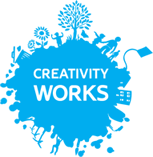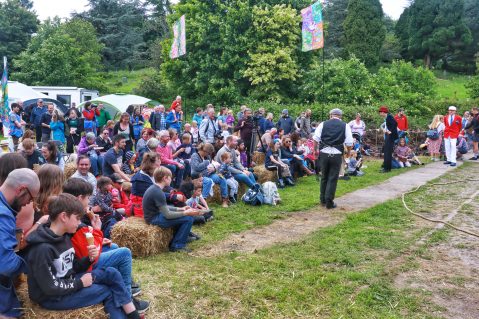News
One Year as a Trustee: Interview with Martin Pople
Our Chair Martin Pople is celebrating one year as a Trustee of Creativity Works. We caught up with him to talk all things Arts and Health.
Congratulations on one year as a trustee of Creativity Work’s and thank you for all of your hard work and support. What have been your highlights to date?
The Radstock Jubilee Festival was fantastic. It was so great to get back to live performance and people coming together. There was a strong sense of community and celebration without such an overwhelming fear of Covid. It was a splendid mix of events, performances, workshops, and time with each other.
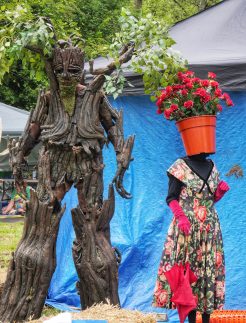
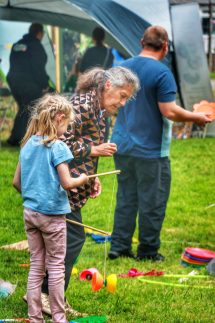
Pictured: The Radstock Jubilee Festival. Photographs by Adrian Wyatt
Celebrating Creativity Works’ 40th Anniversary was also very special. I’d known about the charity for a long time before I became a Trustee, but I wasn’t aware just how long it had been around for. It was incredible to see how much work has been achieved over the past 40 years.
The values and ideals of the charity have remained the same, and they’re just as valid today as they ever were. Creativity belongs at the heart of a community, and I’m proud to be part of this legacy.
What, if anything, have you learnt in your time as a Trustee and Chair for Creativity Works?
I’ve always known art is a fundamental part of life, both for me, our community and culture in general, but when I joined Creativity Works I felt very much like an amateur when it came to Arts and Health. I’m used to theatre and concert audiences enjoying the final outcome of the creative process but the idea that the process itself was the important part and worth focusing on was new to me. I’ve come to learn that the creative process is just as valuable as the final outcome, if not more so. Everyone is able to enjoy being creative, it’s just a case of finding what works for them and what they enjoy.
I’ve also learnt that the word ‘Creativity’ is vastly overused and undervalued. There’s a great deal of focus on what is produced and how it might make money. They’re only interested in the end result. I think Creativity Works has it the right way round, it’s about the process and the value this can have for someone’s mental health and wellbeing.
I think Creativity Works has the same appeal as Bake-Off. Ordinary people, amateurs if you like, can create the most wonderful things for the joy of doing it. They’re creative for the love of it, not for money or anything else. And it’s worth remembering the root of the word ‘amateur’ is the Latin word ‘amare,’ which means ‘to love.’
Our projects get people thinking about how to be creative in their own way in their everyday lives. Great big productions are great but we can do just as much on a more individual, small scale.
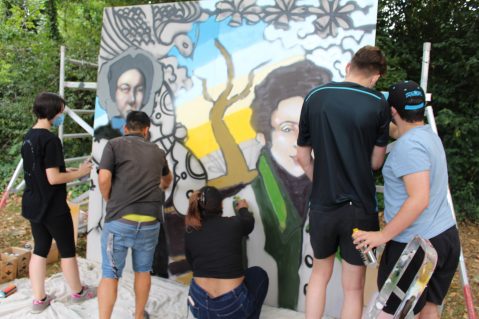
Pictured: Participants of the Reach In Reach Out Project at Holborne Museum
How has mental health in the U.K changed in the time you’ve been a Trustee?
It has got an awful lot worse. The pandemic has had a dreadful affect on people. The lack of human contact, the isolation, it’s bad for everybody. And of course the fear of death. If you’re feeling fearful all the time mental health suffers, and it feels as if we’ve just staggered from one crisis into another. When so many people are afraid they can’t afford the very basic necessities of life – food, shelter, warmth – it creates a society of fear, uncertainty and insecurity, so of course our mental health will be poor. It affects us all.
Creativity Works and arts and culture in general are so important in times like this. Access to nature and creativity is as much a human right as having something to eat. To create is to be human, and there has to be an opportunity for everyone to fulfil their humanity.
Mental health is treated like an individual illness, but we should be looking at it more positively on a community level. In the same way we promote exercise and good diet to look after our physical health, what can we do to promote good mental health? How can we create a less fearful and mentally damaging society?
Where would you like to see Creativity Works in the next five years?
More of what we’ve been doing. Cementing partnerships over a wider geographical area, work with more organisations and reach more communities.
I’d also like our work to be better understood, more highly valued, and to be seen as an essential and integrated part of the community.
What advice would you give people working in Arts and Health today?
I’d give them a huge, supportive pat on the back and ask them to keep at it if they can. You’re doing great work, you help improve people’s lives, and please remember, especially when you’re tired and it feels like a real struggle, you really do make a difference.
